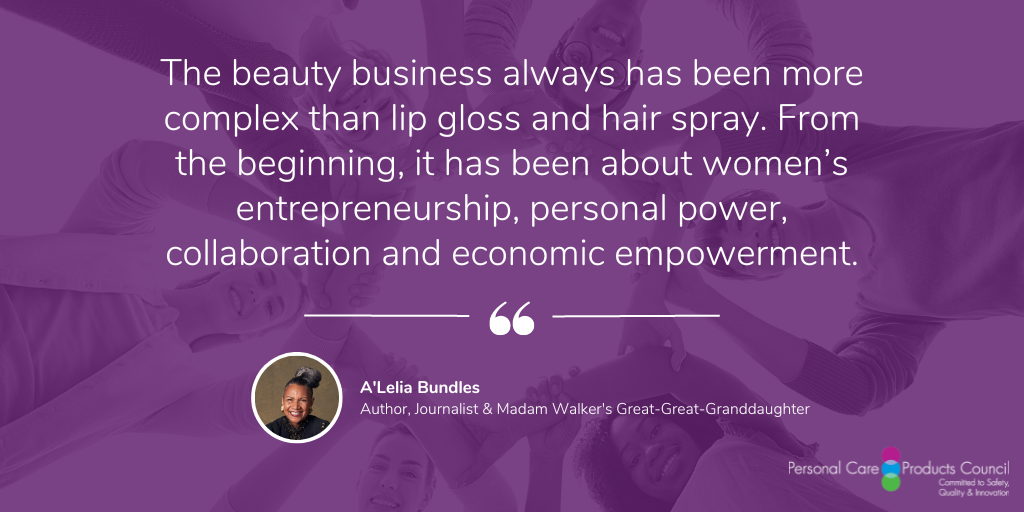Honoring the Legacy of Women Trailblazers: The Power of Beauty. The Power of Women Supporting Women.
By A’Lelia Bundles
Author, Journalist, Madam Walker’s Great-Great-Granddaughter
Our stories are our power! As women we must tell our stories so future generations can see themselves in our triumphs and in our challenges. We must tell our stories so girls grow up assuming they can be bosses and innovators.
As we celebrate International Women’s Day and Women’s History Month, we are showered with magazine cover stories, documentaries, LinkedIn posts and TikTok videos about amazing women. But not so long ago, those stories were hard to find.
When I was in elementary school in the 1950s, my favorite library books were biographies. I loved learning facts about historical figures. But something was missing. Almost all the books were about men. I remember reading about author Louisa May Alcott and pilot Amelia Earhart, but there was nothing on the shelves about Black, Latina, Asian American and Indigenous women. Fortunately, the publishing industry is correcting this omission and women’s history is no longer just a footnote in the larger narrative of human history.
Today, I write the books I wish had been written for me as I tell the story of my great-great-grandmother, Madam C.J. Walker. Born Sarah Breedlove in 1867 on the same cotton plantation where her parents and older siblings had been enslaved, she became an early 20th century entrepreneur and millionaire by selling a line of hair care products created in 1906 specifically for Black women.
Having solved her own hair loss dilemma, she traveled throughout the United States, Central America and the Caribbean recruiting sales agents. Soon the products became a means to a greater end as she realized that her customers needed education and wanted financial independence as much as hair care products.
Madam Walker – like cosmetics industry founders Helena Rubinstein, Coco Chanel, Elizabeth Arden and Mary Kay Ash – knew the beauty business was lucrative. Despite their expertise in product formulation, strategic marketing and customer service, they all struggled to be taken seriously by investors, suppliers and male-dominated banks. Ultimately, their visionary business models prevailed as they employed thousands of women, empowered them economically and encouraged their self-confidence.
These successful businesswomen claimed their seat at the table even if they had to build their own board rooms to do so. They used their clout to fight for women’s rights and against domestic violence. That same spirit of advocacy shines through today, notably among women of color. Their concern for equality and fairness has inspired many beauty industry leaders to join them in supporting the CROWN Act, a law that bans workplace discrimination based on hair texture and styles, particularly those worn by African Americans. While federal legislation has not yet passed, 20 states have enacted their versions.
The beauty business always has been more complex than lip gloss and hair spray. From the beginning, it has been about women’s entrepreneurship, personal power, collaboration and economic empowerment.
Whether today or this month, I hope you will take some time to learn more about trailblazing women. Whether it’s Madam Walker and other cosmetics industry pioneers or women scientists, artists, diplomats, librarians, athletes, elected officials and your own grandmother, they all are a testament to the brilliance, creativity and fortitude of women who have succeeded against the odds.

